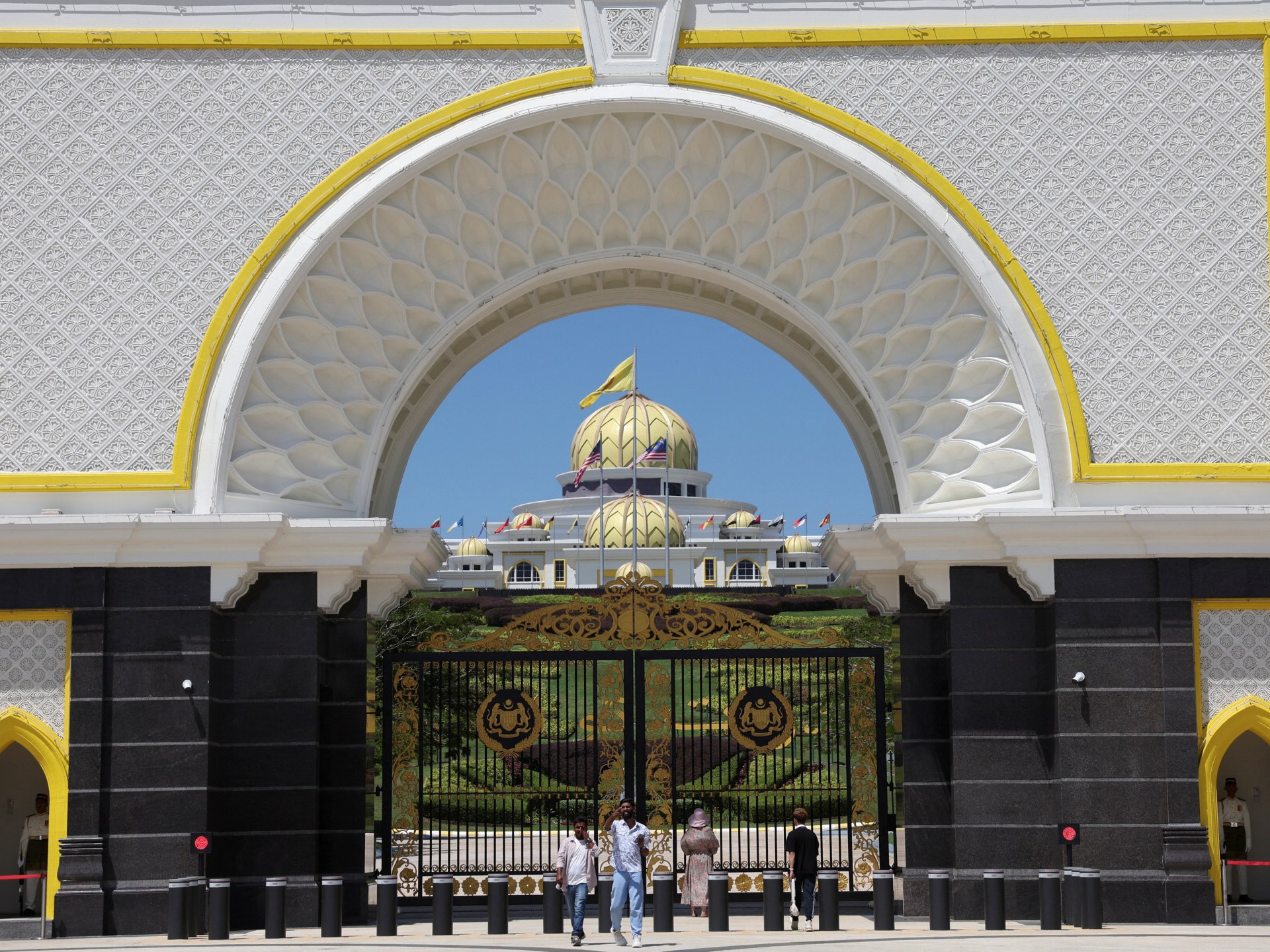
Kuala Lumpur, Malaysia – The last time a sultan from the state of Johor ascended to Malaysia’s throne was in the late 1980s, the country was in the grip of a constitutional crisis as then-Prime Minister Mahathir Mohamad tried to clip the wings of the judiciary.
Now that the current Johor Sultan becomes king, Malaysia faces an anti-corruption crackdown that has entangled some of the most prominent political figures of the Mahathir era, with speculation of a pardon for disgraced former prime minister Najib Razak and ongoing political maneuvering as part of a realignment that began in 2018.
“It is very likely that at some point he will have to decide which side will have greater control of parliament,” Malaysian political analyst Oh Ei Sun told Al Jazeera. “It could happen at any time.”
Sultan Ibrahim Sultan Iskandar, 65, is installed as the incumbent 17. Yang di-Pertuan Agong in a ceremony on Wednesday in Kuala Lumpur that will be broadcast live on state television.
He will be part of Malaysia’s unique rotational monarchy system for five years, in which the country’s nine hereditary rulers take turns as the Yang Di-Pertuan Agong, or ruler-appointed ruler.
While the king is a constitutional monarch who serves as head of state and commander of the armed forces, the upheaval followed historic 2018 elections – when the once-dominant United Malays National Organization (UMNO) was defeated for the first time since Independence – has led to the monarch playing a more important role in the country’s politics.
At the time of this defeat, King Muhammad V of the northeastern state of Kelantan was on the throne and ensured a smooth transfer of power.
When the then 49-year-old decided to step down, his successor, King Sultan Abdullah Sultan Ahmad Shah of the central state of Pahang, used the monarch’s discretionary powers to appoint the country’s prime ministers 2020 And 2021, and after the Election in 2022 when no single party achieved a parliamentary majority.
He also agreed to the request of then Prime Minister Muhyiddin Yassin Emergencywhich suspended Parliament in January 2021 as the COVID-19 pandemic raged.
As Sultan Ibrahim comes to power, Malaysia is in a period of relative calm, with Prime Minister Anwar Ibrahim heading a so-called “unity government” that includes his former rivals in the UMNO as well as representatives from the Bornean states of Sabah and Sarawak.
Yet some politicians continue to fight for power amid deep divisions in Malaysian society, while Daim Zainuddin, the once-powerful right-hand man of Mahathir, Malaysia’s longest-serving prime minister, has been trapped by a crackdown on corruption.
There is also nervousness about the shame former Prime Minister Najib Razak who was sentenced to a 12-year prison sentence of almost 18 months for corruption in connection with the billion-dollar scandal involving the sovereign wealth fund 1MDB.
There is growing speculation that Najib, who has sought a full pardon, could be released despite several ongoing court cases over the scandal.
Some say Najib’s release would help resolve some political divisions in the country as he remains popular among some ethnic Malaysians, who make up more than half the population and have increasingly voted for conservative religious and nationalist parties.
But analysts say such a move risks alienating those who want reform and undermining Malaysia’s international reputation.
Minister in the Prime Minister’s Department (Federal Territories), Zaliha Mustafa, said the pardon committee met at the palace on Monday for the last official engagement for the outgoing king. She did not elaborate on what was discussed.
“Wait for an official statement from the pardon board,” she said, according to the Star, a Malaysian newspaper.
‘Not shy’
Malaysia’s royal families remain strong symbols of identity for many Malaysians and sultans are the guardians of Islam in their own states. Malaysians in Malaysia are always Muslims.
Sultan Ibrahim has previously spoken out against the “Arabization” of Malay culture and stressed the need for moderation in a country where there is a large population of ethnic Chinese Indiansmost of whom are not Muslims.
Independent analyst Asrul Hadi Abdullah Sani says that once he moves into the palace, the new king “will not be afraid” to express his views to Anwar if he is unhappy.
The two men appear to have a close working relationship and share similar concerns, particularly about the need to fight corruption and boost the economy and investment.
This month, Singapore and Malaysia reached a preliminary agreement to establish a Singapore-Johor special economic zone and improve connectivity across the border, one of the busiest in the world.
“Unlike other heads of state who were mostly ceremonial, the Sultan always had a practical approach to state affairs and a working relationship with the prime minister,” Asrul Hadi said, referring to the head of the Johor state government. “He expects a similar relationship with the federal government, but there will likely be resistance from the government, particularly on policy issues.”
Sultan Ibrahim previously caused controversy in an interview with the Singaporean newspaper Straits Times published in December.
Under the headline “No ‘puppet king'”, the sultan said there was a need to fight corruption, ensure “checks and balances” of the government and check the “machinations of self-interested politicians” – a swipe at political manoeuvres, that has shaken the country in recent years.
“He won’t want to get caught up in the politicians’ games,” said Ong Kian Ming, director of the philosophy, politics and economics program at Taylor’s University in Kuala Lumpur and a former MP and deputy trade minister. “He wants political stability so that a strong economic agenda can be set and implemented.”
Sultan Ibrahim is married and has six children. He is one of Malaysia’s richest men and has interests ranging from internet services to ownership, including a stake in the troubled Chinese-backed company Forest City Project.
He is known for his annual road trip across Johor to meet the state’s people – one year from a customized Mack truck – and has a passion for fast cars and planes.
Tunku Ismail Sultan Ibrahim, his eldest son, has since won plaudits for the state’s dominance in domestic football, with Johor Darul Ta’zim FC (JDT) winning the Super League for ten consecutive years.
The family has also demonstrated media savvy, providing glimpses into royal life to hundreds of thousands of followers on social media platforms such as Facebook, Instagram and YouTube.
The posts included videos of the Sultan jokingly meeting people around Johor, as well as a film about the recruitment process for the Royal Johor Military Force, the state’s private army.
Earlier this week, they shared photos and videos from the ceremony where Tunku Ismail Sultan Ibrahim, popularly known as TMJ (the Malay acronym for Tunku Makhota Johor), was appointed regent before his father’s departure to Kuala Lumpur.
The post showed the 39-year-old prince in full military uniform arriving at the palace in a black Rolls Royce and taking the oath.
On Wednesday, attention will turn to Sultan Ibrahim.
Police expect up to 30,000 people to line the streets of the country’s capital, Johor Bahru, to bid farewell to the Sultan on his way to the airport for his flight to Kuala Lumpur.
Well-wishers are also expected in the capital, as the installation ceremony will be broadcast live on television.






Recent Comments